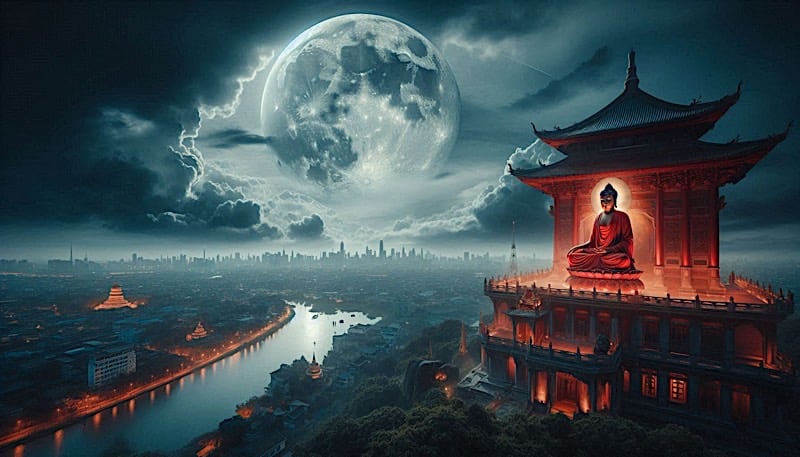
There is a something very precious and special about the practice of chanting the name of Amitabha Buddha: traditionally, the single word chant, Amituofo. When you participate in this elegant and powerful practice, you feel immediate peace and comfort. The entire practice is to chant the name — sometimes just the name, sometimes as a praise — of the Buddha of Infinite Light, Amitabha. [For an in-depth feature on Amitabha, please see>>] [Amitabha Sutra complete translation English at bottom of this feature.]
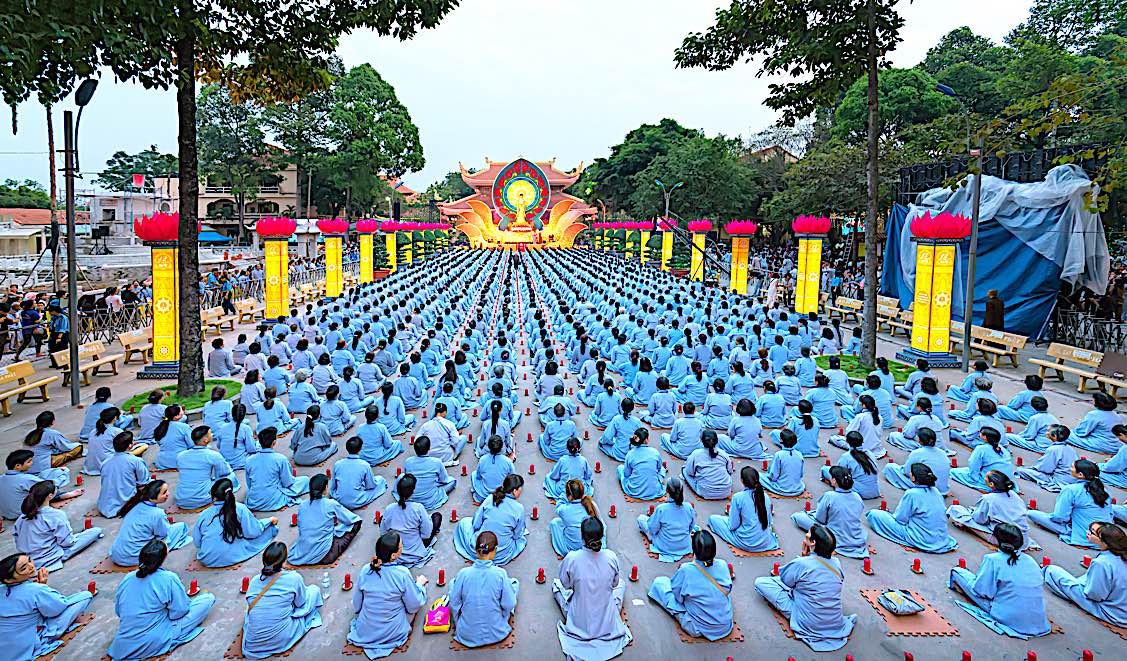
Sometimes this is embellished with the wondrous sound of the hypnotic fish drum, or the regular tinkle of a bell. Sometimes it is chanted musically; sometimes spoken; sometimes whispered. The reward: an immediate feeling of peace and protection. [For a lovely story on Fish Drum practice, see>>]
Many Buddhists in Non-Pureland traditions tend to think the practice is too simple, too reliant on faith and praise. They are missing out on the point if they think this way. Like other traditions with single-focus meditation methods, Pureland Buddhist’s chant the name of Amitabha over and over. Mindfulness of the name of Amitabha is, in fact, a powerful and profound practice.

Ultimately, meditation is empowered by simplicity. Even in tantric visualizations, we see the complex deity mandala dissolving to Emptiness. Mindfulness is blissfully simple. Amituofu practice is quintessentially simple — and deep.
Don’t miss this wonderful chanting of “Amituofo” by hundreds of Buddhists:
Teacher Thich Thien Tam explains [1]:
“Some people misunderstand the Pure Land method, believing it to be entirely focused on practice and devoid of philosophical teaching. That is, in the Pure Land sutras, Sakyamuni Buddha simply describes and explains the Western Pure Land and exhorts everyone to recite the Buddha’s name, seeking rebirth in that Land — without reference to theoretical issues. In truth, however, theory leads to practice, within practice is hidden the element of theory.
Athough the Buddha’s teachings are classified under different headings, such as the Door of Emptiness [Zen, etc.], the Door of Existence [Pure Land, etc.], the “Open” Teaching, the “Secret” [Tantric, etc.] Teaching, they all lean toward, rely on and clarify one another. Thus, there is the Zen School, in which a single meditation riddle (kung an) contains innumerable Dharma teachings.
The same is true of Pure Land: the words “Amitabha Buddha” encompass the teachings of Zen, the Sutra Studies School, the Discipline School and the Esoteric School. Therefore, the ancients have determined that the Pure Land method is a “Sudden Teaching.”
Beautiful (and classical-style) chanting of Namo Amituofo:
Elder Master Ou I describes the benefit of recitation:
“A single recitation of the Buddha’s name, if done correctly, contains the three thousand auspicious bearings and the eighty thousand subtle conducts. All the various Zen riddles and the most expeditious principles of the Sutra Studies method, are also included.”
This is not as esoteric as it sounds. Single-pointed concentration — whether on breath, mind, body — is a fundamental practice in all Buddhist schools. All schools also stress that single-pointed concentration on the “Enlightened body, speech and mind” is the most effective. This is also a the principle behind mantra recitation.
The six syllable Mantra of 10 protections:
Sutra benefits: 10 great benefits
The benefits of the Nianfo (chanting the name of Amitabha Buddha) are extensive, as stated in the Sutras, beginning with karmic purification — it is always meritorious to chant the name of Buddha, and merit helps overcome negativity — and includes the ten great benefits:
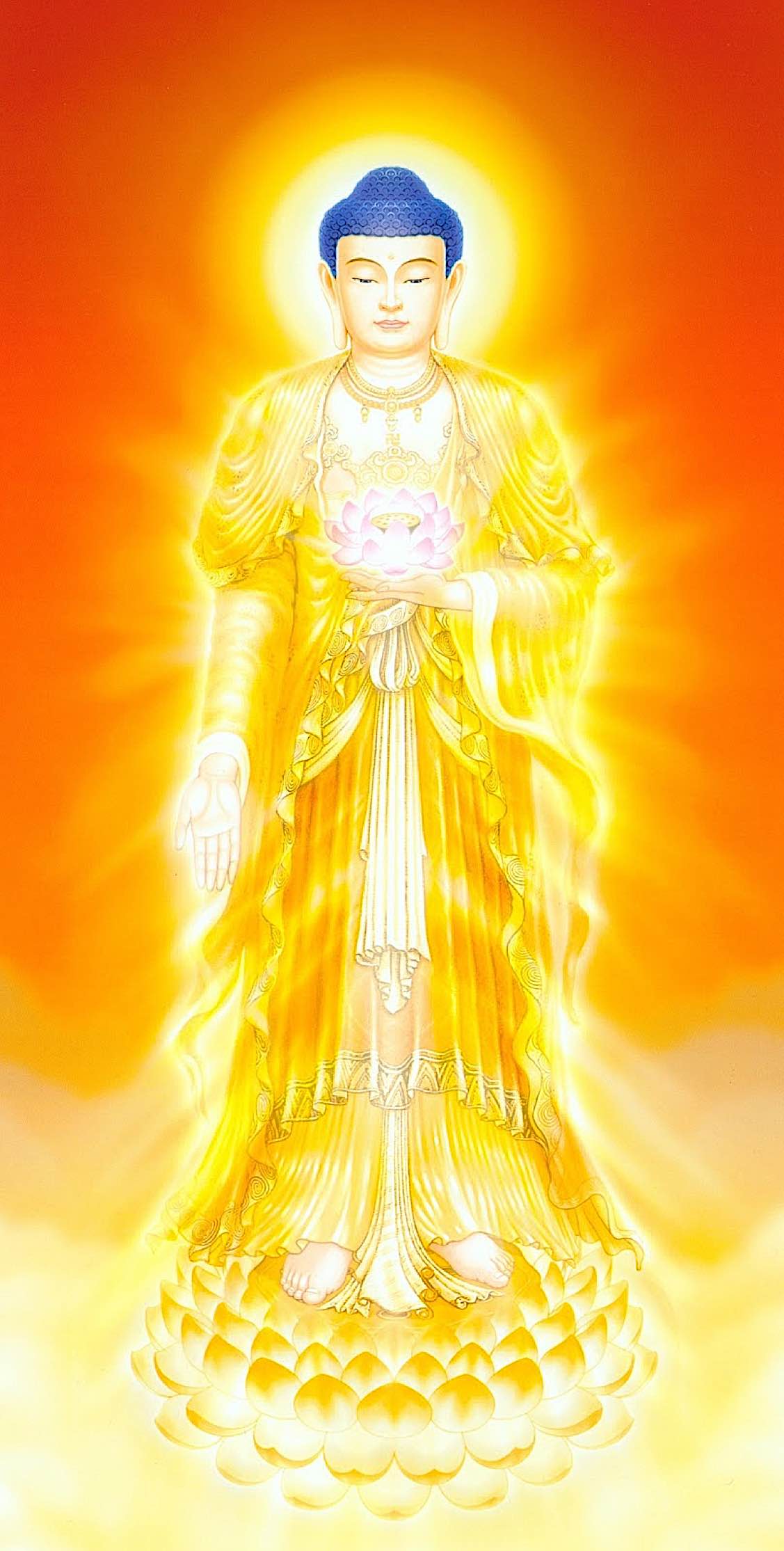
1. Day and night, they enjoy the invisible protection of all celestial beings, powerful deities and their ‘multitudes of retinues’;
2. Twenty-five great Bodhisattvas, including Bodhisattva Avalokitesvara (Kuan Yin) and all other Bodhisattvas constantly keep them in mind and protect them;
3. They enjoy the continuous support and protection of Buddhas; Amitabha Buddha emits constant light to gather them;
4. No evil demons, ferocious animals, poisonous snakes or the like can harm them;
5. They do not meet with calamities such as drowning, burning or other violent deaths, nor do they encounter such punishment as being shackled and imprisoned;
6. Previous evil karma is gradually dissipated; the spirits of those whom they have killed in past lives are liberated and no longer seek revenge;
7. They have restful sleep or dream of auspicious events or view the supremely wonderful body of Amitabha Buddha;
8. Their minds are always joyful and at peace, their complexions clear and bright, their bodies filled with energy and strength; whatever they undertake generally will succeed;
9. They are always honored and assisted by others, and are gladly given the same respect reserved for Buddhas;
10. At the time of death, they would not experience fright, as the right thoughts would manifest themselves. If they vow to be reborn to Amitabha Buddha’s Western Pure Land, at their last breath when they are still mindful of Amitabha’s name, they would witness Amitabha Buddha and the Holy Assembly to come to receive them to the Western Pure Land – Land of Ultimate Bliss where they can free themselves from the suffering of continuous rebirths. It is also a land where they can finally attain Buddhahood.
Video About Amitabha including his previous life as a Bodhisattva:
Nianfo or Nembutsu
Chanting the name of the Buddha of Infinite Light is called Nianfo (transliteration Chinese), Nembutsu (Japanese). Another powerful practice is to chant his mantra, Om Ami Deva Hri in Tibetan style, here chanted by the magnificent voice of Yoko Dharma in a Buddha Weekly video — with lovely visualizations of Amitabha and Amitayus (Amitabha’s aspect, as the Buddha of Long Life):
How to chant
“A mi tuo” is the transliteration of the Sanskrit word “Amida” which means “boundless” (无量, “wuliang”). “Fo” is the Chinese word for “Buddha”.
Although the chant seems to lose something in “English” — that’s probably a prejudice — you can chant Amitabha’s name in any language. In English, you would chant “Amitabha Buddha” or “Amita Buddha.” But there is something more empowering and serene about chanting in either Chinese or Sankrit.
- Chinese: Namo Amituofo — (or just “Amituofo”)
- Japanese: Namu Amida Butsu
- Sanskrit: Amitabha Buddhaya (or, his mantra: Om Amitabha Hrih)
- Vietnamese: Nam Mo A Di Da Phat
- Korean: Amita Bul
- Tibetan: Om Ami Deva Hri (Tibetan version of Sanskrit mantra, rather than name alone.)
- English: Amitabha Buddha (or Buddha of Limitless Light)
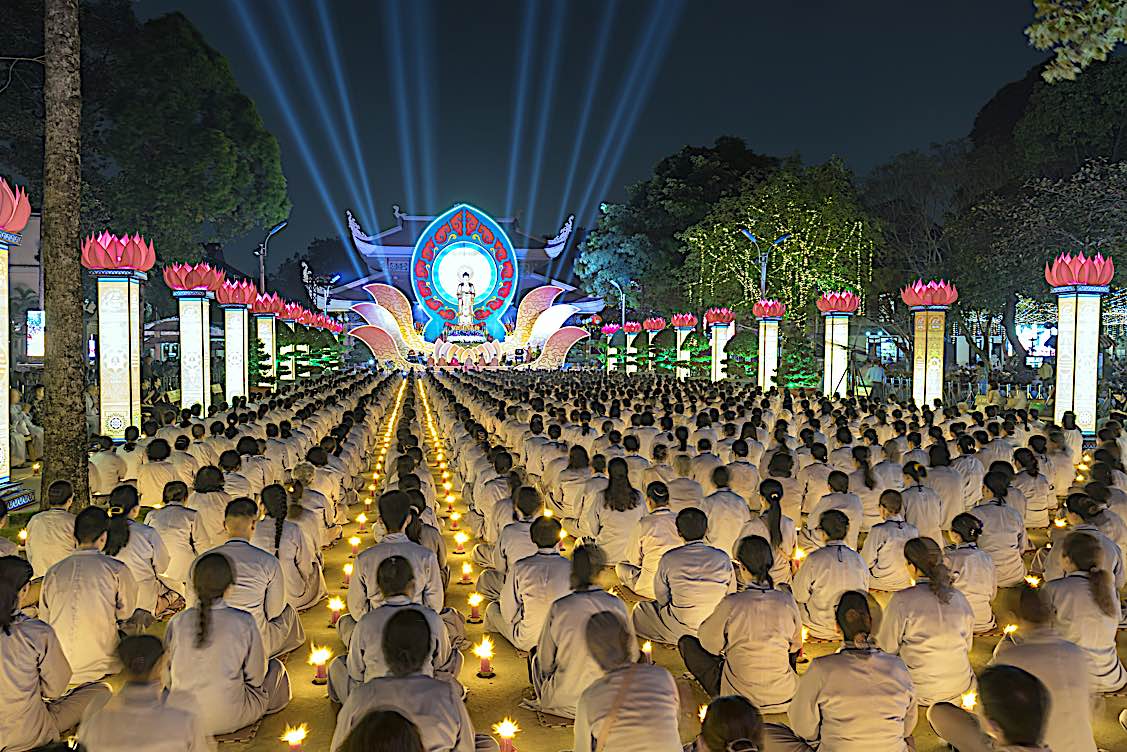
Visualization
Visualization is not a necessary part of practice, but it’s certainly desirable and meritorious to visualize Amitabha in his infinite light glory, usually with his two chief Bodhisattvas Guanyin (Avalokiteshvara in Sanskrit; Kuanyin, Kanon on Japanese) and Mahāsthāmaprāpta. In Tibetan traditions, the mandala of Amitabha’s Pureland might be visualized.
[For a guided Powa meditation on Amitabha-Amitayus and the Pureland, see video>>]
One of the main Amitabha Sutras is translated in text below. For an “animated” version of this, see:
Amitabha Sutra
Translated into Chinese by Tripitaka Master Kumarajiva
Translated from Chinese into English by J.C. Cleary
Thus have I heard:
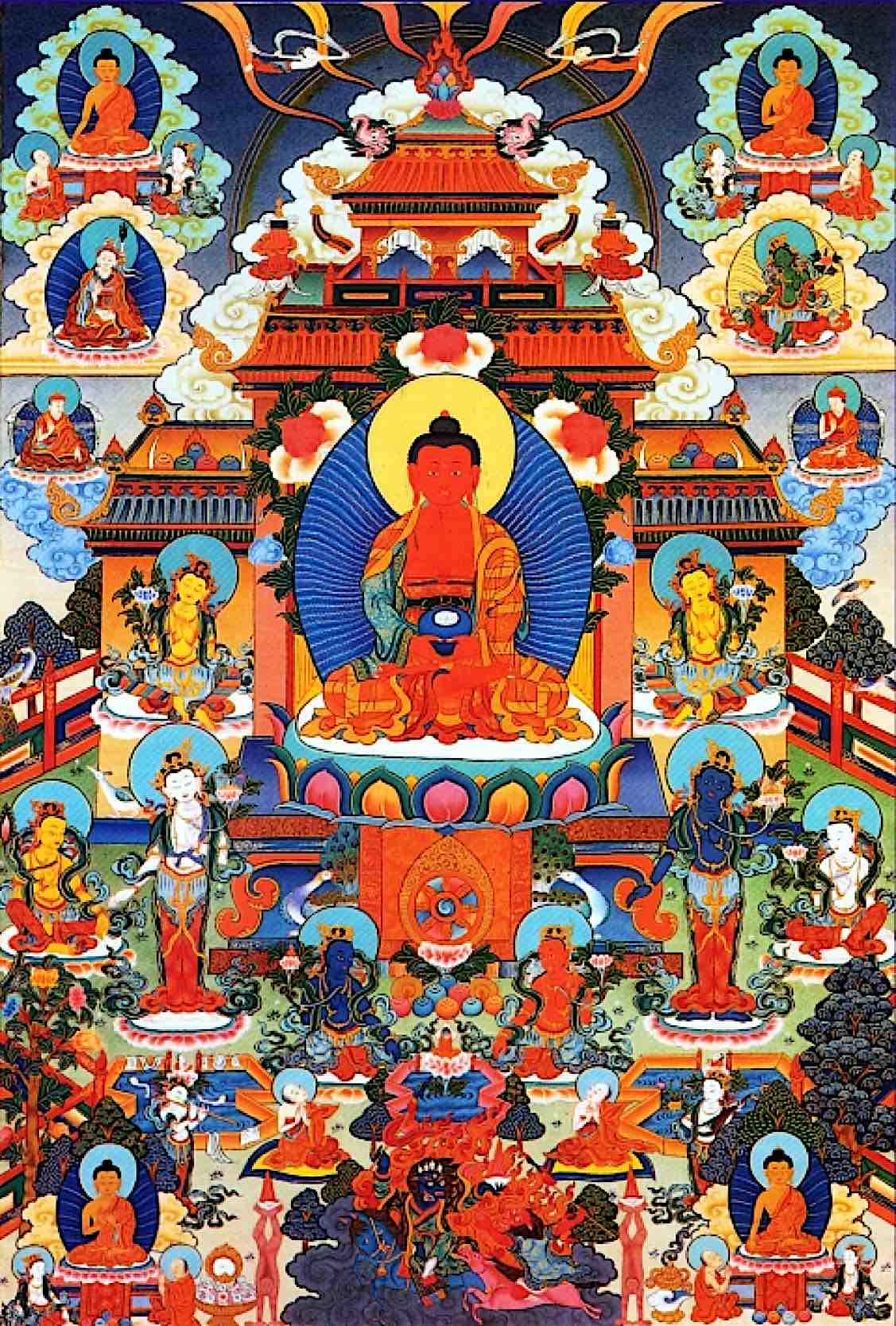
Once Buddha was in the land of Shravasti, in the garden of Jeta and Anathapindika. He was accompanied by twelve hundred and fifty great Bhikshus, all of them great Arhats, well known to the assembly. Among them were his leading disciples, such figures as the Elders Shariputra, Maudgalyayana, Mahakashyapa, Maha Katyayana, and Mahakausthila, Revata, Suddhipanthaka, Nanda, Ánanda, Rahula, Gavampati, Pindola-bharadvaja, Kalodayin, Mahakapphina, Vakula, and Aniruddha, etc., all great disciples. Also present were the Bodhisattvas Mahasattva: Manjushri, Prince of the Dharma, the Bodhisattva Ajita the Invincible, and the Bodhisattva of Constant Progress, Gandhahastin, Nityodyukta, and other such great enlightening beings. Also present was Shakra, the king of the gods, along with countless numbers of heavenly beings, making up a great assembly.
At that time Buddha said to the Elder Shariputra: “West of here, past a hundred billion Buddha-lands, there exists a world called “Ultimate Bliss”. In this land there exists a Buddha called Amitabha, who is expounding the Dharma right now.
[Buddha says to Shariputra:] “Why is this land called Ultimate Bliss”? It is called “Ultimate Bliss” because the sentient beings in this land are free from the myriad sufferings, and only know every kind of joy.
Furthermore, this land is called “Ultimate Bliss” because it is surrounded by seven rings of railings, and seven layers of nets, and seven rows of trees, all made of the four precious jewels.
Moreover, the Land of Ultimate Bliss has many jeweled ponds filled with the waters of eight virtues. The bottom of each of the ponds is pure golden sand, and the stepped walkways that lead up from all four sides of each of the ponds are made of gold, silver, lapis lazuli and crystal. Above the ponds there are towers which are adorned with silver and gold and lapis lazuli and crystal and mother of pearl and red agate. In the ponds there are lotus flowers as big as cart wheels: blue ones shining with blue light, yellow ones shining with yellow light, red ones shining with red light, and white ones shining with white light, each emitting a subtle pure fragrance.
The Land of Ultimate Bliss is complete with all these merits and adornments.
And there is more — celestial music is constantly playing in this Buddha-land, and the ground is made of tawny gold. Flowers in the shape of heavenly orbs rain down at all hours of the day and night. Every morning the sentient beings of this land decorate their garments with multitudes of wondrous flowers and make offerings to hundreds of billions of Buddhas in other worlds. When it is meal time, they return to their own lands, to eat and circumambulate [the teaching assembly].
The Land of Ultimate Bliss is complete with all these merits and adornments.
And there is more still — in this land there are birds of all sorts of wondrous variegated colors: white cranes, peacocks, orioles, myna birds, cuckoos. All these birds bring forth harmonious songs day and night. Their songs communicate such Buddhist teachings as the five roots, the five powers, the seven factors of enlightenment, the eightfold path, as well as other teachings. When the sentient beings in this land hear the voices of the birds, they are mindful of the Buddhas, mindful of the Dharma [Buddha’s teachings], and mindful of the Sangha [Community of Seekers of Enlightenment].
Do not think that these birds were born as birds due to karmic retribution for past misdeeds. Why not? In this Buddha-land, the three evil planes of existence (as animals, hungry ghosts, and hell-beings) do not exist.
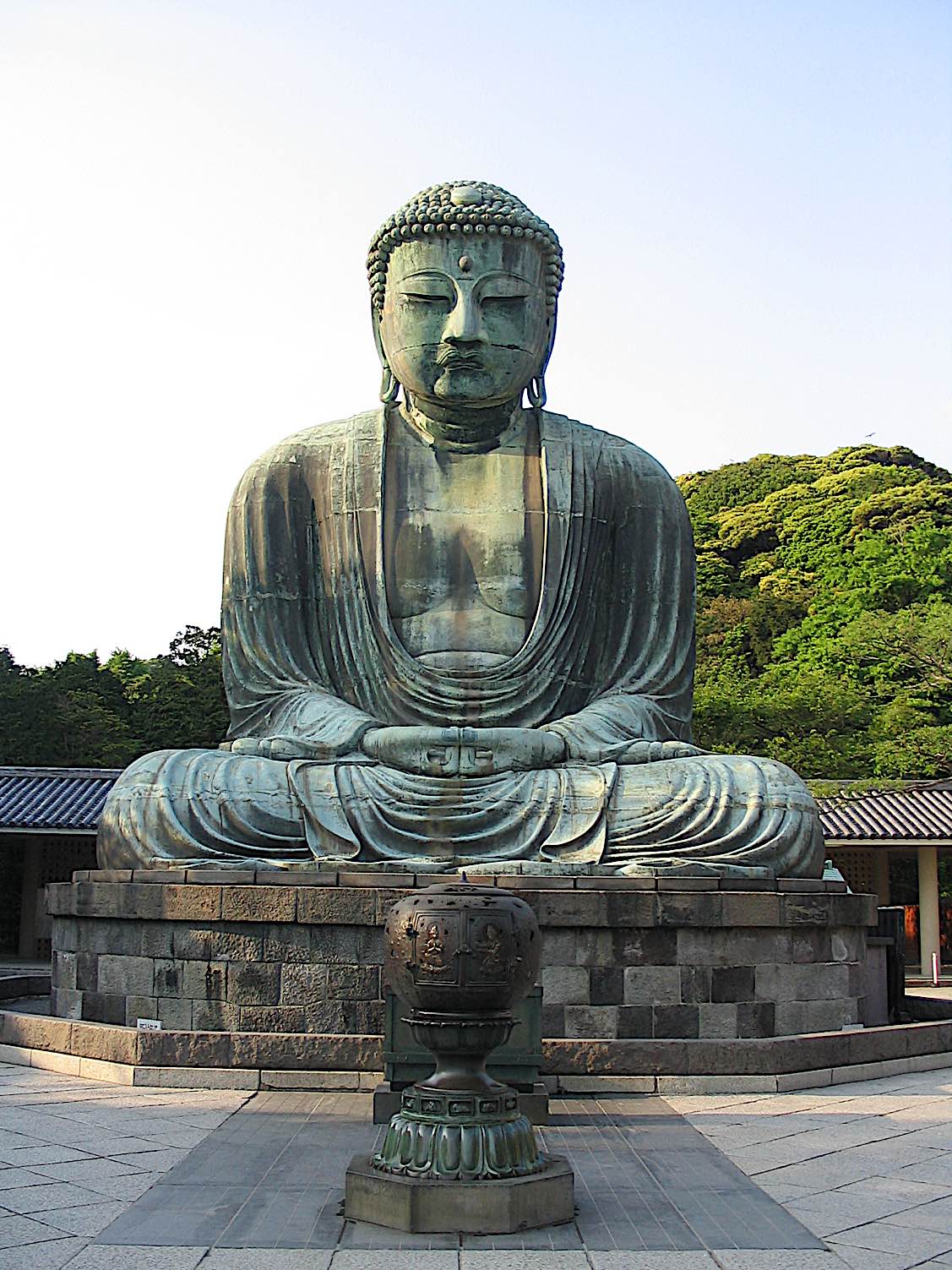 In this Buddha-land even the names of the evil planes of existence do not exist, much less the realities. All these birds are the creations of Amitabha Buddha, fashioned in order to broadcast the sounds of the Dharma.
In this Buddha-land even the names of the evil planes of existence do not exist, much less the realities. All these birds are the creations of Amitabha Buddha, fashioned in order to broadcast the sounds of the Dharma.
In this Buddha-land, there is a slight breeze that stirs the rows of jewel trees and jewel nets, so that they emit subtle wondrous sounds, like hundreds and thousands of melodies playing all at once. All those who hear these sounds spontaneously develop the intention to be mindful of the Buddha, mindful of the Dharma, and mindful of the Sangha.
This Buddha-land is complete with all these merits and adornments.
What do you think: why is this Buddha called Amitabha?
The light of this Buddha is infinite, and shines on all lands throughout the universe without obstruction. Thus this Buddha is called Amitabha.
Also, the life span of this Buddha and his people is an infinite number of immeasurable eons, and so he is called Amitabha.
Amitabha Buddha attained enlightenment ten eons ago.
Moreover, this Buddha has innumerable disciples, all of whom are Arhats, and whose numbers are incalculable. Amitabha also has a following of innumerable Bodhisattvas.
The Land of Ultimate Bliss is complete with all these merits and adornments.
None of the sentient beings who are born in the Land of Ultimate Bliss ever fall back into a lower realm [i.e., they are avaivartika]. Many among them have only one more lifetime [to go before enlightenment]. These beings are very numerous, and their number is incalculable: they can be spoken of as innumerable.
When sentient beings hear [of the Land of Ultimate Bliss], they must take a vow to be born in this land. Why so? So that they can be together with all these beings of superior goodness.
One cannot be born in this land through minor good roots, blessings, virtues and causal connections.
If there are good men or good women who hear of Amitabha Buddha, and recite his name single mindedly and without confusion, for one day or two days or three days or four days or five days or six days or seven days, then when these people are about to die, Amitabha Buddha and all the sages who are with him will appear before them. When these people die, their minds will not fall into delusion, and they will attain rebirth in Amitabha Buddha’s Land of Ultimate Bliss.
I have seen this benefit, and so I speak these words. If sentient beings hear what I say, they must make a vow to be born in that land.
Right now I am extolling the benefits of the inconceivable merits of Amitabha Buddha. But in the eastern direction there are also countless other Buddhas, like Akshobhya Buddha, and the Buddha “Marks of the Polar Mountain”, and the Buddha “Great Polar Mountain”, and the Buddha “Light of the Polar Mountain”, and the Buddha “Wondrous Voice”. Each of them preaches in his own land with the eloquence of a Buddha, and covers a whole cosmos, speaking the truth. All of you sentient beings should believe this scripture extolling their inconceivable merits, and which all Buddhas protect and keep in mind.
In the worlds of the southern direction there are countless other Buddhas, like the Buddha “Lamp of the Sun and Moon”, and the Buddha “Light of Renown”, and the Buddha “Great Flaming Shoulders”, and the Buddha “Lamp of the Polar Mountain”, and the Buddha “Infinite Progress”. Each of them preaches in his own land with the eloquence of a Buddha, and covers a whole cosmos, speaking the truth. All of you sentient beings should believe this scripture extolling their inconceivable merits, and which all Buddhas protect and keep in mind.
In the worlds of the western direction there are countless other Buddhas, like the Buddha “Infinite Life”, and the Buddha “Innumerable Characteristics”, and the Buddha “Innumerable Banners”, and the Buddha “Great Light”, and the Buddha “Great Illumination”, and the Buddha “Mark of Reality”, and the Buddha “Light of Purity”. Each of them preaches in his own land with the eloquence of a Buddha, and covers a whole cosmos, speaking the truth, All of you sentient beings should believe this scripture extolling their inconceivable merits, and which all Buddhas protect and keep in mind.
In the worlds of the northern direction there are countless other Buddhas, like the Buddha “Flaming Shoulders”, and the Buddha “Supreme Voice”, and the Buddha “Unstoppable”, and the Buddha “Born of the Sun”, and the Buddha “Netted Light”. Each of them preaches in his own land with the eloquence of a Buddha, and covers a whole cosmos, speaking the truth. All of you sentient beings should believe this scripture extolling their inconceivable merits, and which all Buddhas protect and keep in mind.
In the worlds of the nadir there are countless other Buddhas, like the Buddha “Lion”, and the Buddha “Repute”, and the Buddha “Light”, and the Buddha “Dharma Banner”, and the Buddha “Upholding the Dharma”. Each of them preaches in his own land with the eloquence of a Buddha, and covers a whole cosmos, speaking the truth. All of you sentient beings should believe this scripture extolling their inconceivable merits, and which all Buddhas protect and keep in mind.
In the worlds of the zenith there are countless other Buddhas, like the Buddha “Pure Voice”, and the Buddha “Sojourner King”, and the Buddha “Incense Fragrance”, and the Buddha “Fragrant Light”, and the Buddha “Great Blazing Shoulders”, and the Buddha “Body of Multicolored Jewel Flower Garlands”, and the Buddha “Sala Tree King”, and the Buddha “Precious Flower Virtue”, and the Buddha “Sees All Truths”, and the Buddha “Like the Polar Mountain”. Each of them preaches in his own land with the eloquence of a Buddha, and covers a whole cosmos, speaking the truth. All of you sentient beings should believe this scripture extolling their inconceivable merits, which all Buddhas protect and keep in mind.
Why do you think this is called the sutra that is protected and kept in mind by all the Buddhas?
If there are good men and good women who hear this scripture, accept it, and uphold it, and they hear the names of all these Buddhas, all these good men and good women will be protected and kept in mind by all these Buddhas, and all of them will reach the level where they do not turn back from complete, unexcelled, correct enlightenment. Therefore, all of you should faithfully accept what I say and what all the Buddhas have said.
All those people who have vowed, or are vowing, or will vow to be born in the land of Amitabha Buddha reach the level where they do not turn back from complete, unexcelled enlightenment, whether in their past lives, their present lives, or their future lives. Therefore; all good men and good women, if they have faith, must make a vow to be born in that land.
Just as I am now extolling the inconceivable merits of all the Buddhas, all those Buddhas are likewise extolling my inconceivable merits, with these words: “Shakyamuni Buddha is able to carry out a most difficult and rare task. In the world “Endurance” [this world], in an evil world of the Five Corruptions -the corruption of the age, the corruption of views, the corruption of afflictions, the corruption of sentient beings, and the corruption of life — he is able to achieve complete, unexcelled enlightenment, and to expound the Truth which all beings in all worlds find hard to believe.”
Know then that in the midst of this evil world of the Five Corruptions, I am able to carry out this difficult task, attain complete, unexcelled enlightenment, and expound the Truth which is so hard to believe for beings in all worlds. This is indeed most difficult!
When Buddha had finished preaching this scripture, Shariputra and all the monks and all the other gods and humans and asuras and the rest who had been listening, having heard what the Buddha said, rejoiced and faithfully accepted it. They all bowed in homage and departed.
NOTES
[1] “How to Chant” Pureland Buddhism

